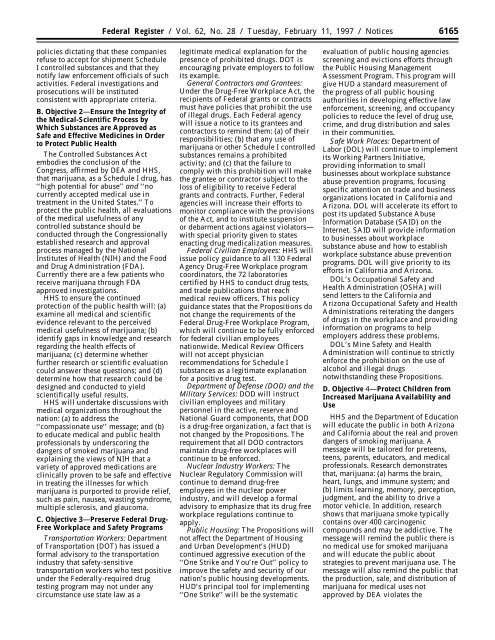federal register - U.S. Government Printing Office
federal register - U.S. Government Printing Office
federal register - U.S. Government Printing Office
You also want an ePaper? Increase the reach of your titles
YUMPU automatically turns print PDFs into web optimized ePapers that Google loves.
Federal Register / Vol. 62, No. 28 / Tuesday, February 11, 1997 / Notices6165policies dictating that these companiesrefuse to accept for shipment ScheduleI controlled substances and that theynotify law enforcement officials of suchactivities. Federal investigations andprosecutions will be institutedconsistent with appropriate criteria.B. Objective 2—Ensure the Integrity ofthe Medical-Scientific Process byWhich Substances are Approved asSafe and Effective Medicines in Orderto Protect Public HealthThe Controlled Substances Actembodies the conclusion of theCongress, affirmed by DEA and HHS,that marijuana, as a Schedule I drug, has‘‘high potential for abuse’’ and ‘‘nocurrently accepted medical use intreatment in the United States.’’ Toprotect the public health, all evaluationsof the medical usefulness of anycontrolled substance should beconducted through the Congressionallyestablished research and approvalprocess managed by the NationalInstitutes of Health (NIH) and the Foodand Drug Administration (FDA).Currently there are a few patients whoreceive marijuana through FDAapproved investigations.HHS to ensure the continuedprotection of the public health will: (a)examine all medical and scientificevidence relevant to the perceivedmedical usefulness of marijuana; (b)identify gaps in knowledge and researchregarding the health effects ofmarijuana; (c) determine whetherfurther research or scientific evaluationcould answer these questions; and (d)determine how that research could bedesigned and conducted to yieldscientifically useful results.HHS will undertake discussions withmedical organizations throughout thenation: (a) to address the‘‘compassionate use’’ message; and (b)to educate medical and public healthprofessionals by underscoring thedangers of smoked marijuana andexplaining the views of NIH that avariety of approved medications areclinically proven to be safe and effectivein treating the illnesses for whichmarijuana is purported to provide relief,such as pain, nausea, wasting syndrome,multiple sclerosis, and glaucoma.C. Objective 3—Preserve Federal Drug-Free Workplace and Safety ProgramsTransportation Workers: Departmentof Transportation (DOT) has issued aformal advisory to the transportationindustry that safety-sensitivetransportation workers who test positiveunder the Federally-required drugtesting program may not under anycircumstance use state law as alegitimate medical explanation for thepresence of prohibited drugs. DOT isencouraging private employers to followits example.General Contractors and Grantees:Under the Drug-Free Workplace Act, therecipients of Federal grants or contractsmust have policies that prohibit the useof illegal drugs. Each Federal agencywill issue a notice to its grantees andcontractors to remind them: (a) of theirresponsibilities; (b) that any use ofmarijuana or other Schedule I controlledsubstances remains a prohibitedactivity; and (c) that the failure tocomply with this prohibition will makethe grantee or contractor subject to theloss of eligibility to receive Federalgrants and contracts. Further, Federalagencies will increase their efforts tomonitor compliance with the provisionsof the Act, and to institute suspensionor debarment actions against violators—with special priority given to statesenacting drug medicalization measures.Federal Civilian Employees: HHS willissue policy guidance to all 130 FederalAgency Drug-Free Workplace programcoordinators, the 72 laboratoriescertified by HHS to conduct drug tests,and trade publications that reachmedical review officers. This policyguidance states that the Propositions donot change the requirements of theFederal Drug-Free Workplace Program,which will continue to be fully enforcedfor <strong>federal</strong> civilian employeesnationwide. Medical Review <strong>Office</strong>rswill not accept physicianrecommendations for Schedule Isubstances as a legitimate explanationfor a positive drug test.Department of Defense (DOD) and theMilitary Services: DOD will instructcivilian employees and militarypersonnel in the active, reserve andNational Guard components, that DODis a drug-free organization, a fact that isnot changed by the Propositions. Therequirement that all DOD contractorsmaintain drug-free workplaces willcontinue to be enforced.Nuclear Industry Workers: TheNuclear Regulatory Commission willcontinue to demand drug-freeemployees in the nuclear powerindustry, and will develop a formaladvisory to emphasize that its drug freeworkplace regulations continue toapply.Public Housing: The Propositions willnot affect the Department of Housingand Urban Development’s (HUD)continued aggressive execution of the‘‘One Strike and You’re Out’’ policy toimprove the safety and security of ournation’s public housing developments.HUD’s principal tool for implementing‘‘One Strike’’ will be the systematicevaluation of public housing agenciesscreening and evictions efforts throughthe Public Housing ManagementAssessment Program. This program willgive HUD a standard measurement ofthe progress of all public housingauthorities in developing effective lawenforcement, screening, and occupancypolicies to reduce the level of drug use,crime, and drug distribution and salesin their communities.Safe Work Places: Department ofLabor (DOL) will continue to implementits Working Partners Initiative,providing information to smallbusinesses about workplace substanceabuse prevention programs, focusingspecific attention on trade and businessorganizations located in California andArizona. DOL will accelerate its effort topost its updated Substance AbuseInformation Database (SAID) on theInternet. SAID will provide informationto businesses about workplacesubstance abuse and how to establishworkplace substance abuse preventionprograms. DOL will give priority to itsefforts in California and Arizona.DOL’s Occupational Safety andHealth Administration (OSHA) willsend letters to the California andArizona Occupational Safety and HealthAdministrations reiterating the dangersof drugs in the workplace and providinginformation on programs to helpemployers address these problems.DOL’s Mine Safety and HealthAdministration will continue to strictlyenforce the prohibition on the use ofalcohol and illegal drugsnotwithstanding these Propositions.D. Objective 4—Protect Children fromIncreased Marijuana Availability andUseHHS and the Department of Educationwill educate the public in both Arizonaand California about the real and provendangers of smoking marijuana. Amessage will be tailored for preteens,teens, parents, educators, and medicalprofessionals. Research demonstratesthat, marijuana: (a) harms the brain,heart, lungs, and immune system; and(b) limits learning, memory, perception,judgment, and the ability to drive amotor vehicle. In addition, researchshows that marijuana smoke typicallycontains over 400 carcinogeniccompounds and may be addictive. Themessage will remind the public there isno medical use for smoked marijuanaand will educate the public aboutstrategies to prevent marijuana use. Themessage will also remind the public thatthe production, sale, and distribution ofmarijuana for medical uses notapproved by DEA violates the


